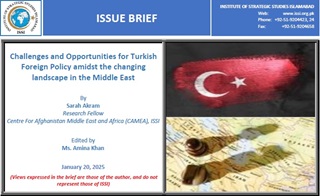Turkiye’s increasingly significant role in the Middle East is self-evident. From a policy of ‘zero problems with neighbours’ to formidable challenges and vast new opportunities, developments in the region have substantially shaped Turkiye’s active foreign policy profile. Located at a pivotal crossroads, regional conflicts and the consequences arising therefrom have often presented Turkiye with multiple dilemmas — having to grapple with issues like terrorism, massive influx of refugees, and fear of being affected by pervasive instability.
Over the past several years, Turkiye has experienced constraints vis-a-vis its relationships with some of the Gulf Cooperation Council (GCC) countries. Since 2021, however, Ankara has pursued reconciliation initiatives aimed at improving relations with the Kingdom of Saudi Arabia (KSA), United Arab Emirates (UAE), and other countries in the immediate neighbourhood. Ankara’s frayed relationship with Egypt has also undergone a positive transformation. Further, attempts were made to improve relations with Syria and Israel; however, the relentless Israeli assault against the Palestinians in Gaza continued a downturn in bilateral relations.[1] The dramatic events in Syria in December 2024, culminating in the fall of the al-Assad regime, have catapulted Turkiye to unprecedented pre-eminence in the Syrian context.
















